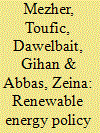| Srl | Item |
| 1 |
ID:
125633


|
|
|
|
|
| Publication |
2013.
|
| Summary/Abstract |
This paper applies a multi-criteria analysis (MCA) and marginal abatement cost curves (MACC) to evaluate public policies mechanisms to promote the dissemination of energy efficiency (EE) and on-site renewable energy sources (RES) technologies in Brazilian buildings sector. The objective here is to bring together the advantages of both methods in order to provide more valuable insights to policy makers. The MCA results show that in the case of more integrative policies, which considers, for instance, potential of jobs creation, the mechanisms to foster distributed RES and solar water heaters are better ranked than in MACC analysis, where only cost-effectiveness of each option is evaluated. Other key finding is that: (1) there is a significant cost effective potential that could be reached through alternative mechanisms not implemented yet in the country, such as public procurement regulation and building codes and; (2) minimum energy performance standards (MEPS) could be broader in scope and more stringent and include the use of energy in standby mode and tubular fluorescent lamps. In particular, some important appliances such as large air conditioning devices should have more aggressive MEPS.
|
|
|
|
|
|
|
|
|
|
|
|
|
|
|
|
| 2 |
ID:
111425


|
|
|
|
|
| Publication |
2012.
|
| Summary/Abstract |
Climate change and fossil fuel depletion are the main drivers for the recent focus on Renewable Energy (RE) resources. However, since the high cost of RE technologies is the main obstacle facing the diffusion of RE power generation, economic and political intervention is inevitable. In the United Arab Emirates (UAE) population and economic growth are the main causes of a sharp increase of energy demand. Two key related factors highlight the need to establish a RE sector: first the UAE has one of the highest carbon footprint in the world and second, the rate of depletion of its main energy generation resource - fossil fuel. In this study, we present a review of overall policies in sixty-one countries, focusing on their efforts to adopt RE resources in the power sector, and on their implementation of fundamental policies implemented. Furthermore, we investigate the applicability to Abu Dhabi UAE of the main RE policies implemented worldwide. As a result of our analysis, we recommend the implementation of a mixed policy of Feed-in-Tariff (FIT) and the Quota system for RE electricity generation in order for the UAE to meet its 7% target by 2020.
|
|
|
|
|
|
|
|
|
|
|
|
|
|
|
|